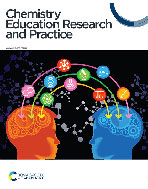“What are they talking about?” A sociocultural linguistic approach to practical task effectiveness
Abstract
This case study demonstrates teaching and learning activities in the school laboratory, and employs talk moves for the direct assessment of practical task effectiveness. By adopting a sociocultural linguistic approach (SCLA), learning chemistry is understood to be a discursive process in which knowledge is constructed through social interaction and language. Thus, learning may be identified by attending to the language used in classroom discourse. The multimodal communication that took place during two acid and alkali practical lessons for learners aged 11 and 12 years was filmed and transcribed. Analysis of the transcripts revealed the language learning opportunities afforded by the tasks and demonstrated that school chemistry practical lessons can be understood in terms of three linguistic opportunities: introducing, using, and reflecting upon language. This lesson structure could be employed to plan more inclusive and equitable practical lessons which foreground language and value discussion equally to manipulating equipment. Recasting practical lessons as sites for learning and using the language of chemistry, key words introduced by the teacher are tracked and counted throughout the lesson to identify when they are used and by whom. The novel 3-part practical (3P) framework and multimodal discourse analysis are employed to assign the use of key words to the macroscopic, submicroscopic or symbolic level of thought. This analysis reveals the centrality of a results table to structuring talk and the detrimental effect of introducing novice learners to multiple levels of thought simultaneously. The Talk Identification (ID) Grid has been developed and used here to analyse student group discourses using talk moves to signpost learning in the domain of ideas and the domain of observables. Descriptors are provided to support instructors in identifying talk moves and how these moves relate to practical task effectiveness to target interventions that improve learning procedural and conceptual knowledge in the laboratory.


 Please wait while we load your content...
Please wait while we load your content...